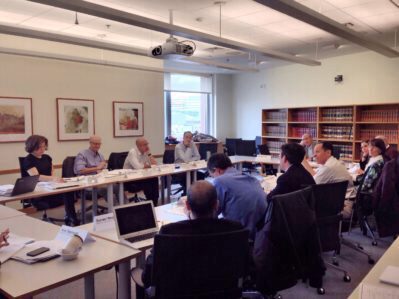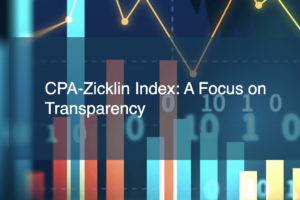Funded Research
2015-2016
Corporate Responses to the UN Guiding Principles on Business and Human Rights
Janice Bellace, The Wharton School
The Permissibility of Blame
Vikram Bhargava, The Wharton School
Media and Corruption
Sterling Horne, The Wharton School
When Business and Conscience Collide
Amy Sepinwall, The Wharton School
Assessing the Impacts of the World Bank’s Integrity Vice Presidency Stakeholder and Partner Survey
Danielle Warren, Rutgers University
Never Audit Again: Learning About Hiring Discrimination Without Deception
Judd Kessler, The Wharton School
Dodd-Frank & International Governance
David Zaring, The Wharton School
2014-2015
National Security and Military Leadership: Can They Bridge the Ideological Gap on Renewable Energy?
Sarah Light, Dena Gromet, and Howard Kunreuther, The Wharton School
The Effect of Individual Differences on Responses to Corporate Social Responsibility and Irresponsibility
Danielle Warren, Rutgers University
Corporate Responses to the UN Guiding Principles on Business and Human Rights
Janice Bellace, The Wharton School
Intellectual Property Theft
Vikram Bhargava, The Wharton School
Identifying the Boundaries of Unlawful Collusion
Joseph Harrington, The Wharton School
Media and Corruption
Sterling Horne, The Wharton School
The World Bank Debarment Process: How much does it cost?
Vik Khanna, University of Michigan
Never Audit Again: Learning about hiring discrimination without deception
Judd Kessler, The Wharton School
Opening the Black Box of Corporate Divestiture
Patia McGrath, The Wharton School
The Dark Side of Being the Underdog: Do low expectations fuel unethical behavior at the workplace?
Samir Nurmohamed, The Wharton School
How Emotions Influence Ethical Decision Making
Maurice Schweitzer, The Wharton School
The Motivating Force of Carrot versus Stick Incentives on Prosocial Behavior
Deborah Small, The Wharton School
British Petroleum: Safety record from growth to decline
Natalya Vinokurova, The Wharton School
Clicks and Editorial Preferences in News Coverage
Pinar Yildirim, The Wharton School
When Business and Conscience Collide
Amy Sepinwall, The Wharton School
Dodd-Frank & International Governance
David Zaring, The Wharton School
2013-2014
Global Supply Chain: What Rights Are Audited
Janice Bellace, The Wharton School
Trust in Banks
Vikram Bhargava, The Wharton School
Encouraging Cooperation in Digital Negotiations
Livia Levine, The Wharton School
International Corporate and Individual Legal Accountability for Information Harms
Andrea Matwyshyn, The Wharton School
Penn Global Social Impact: A Partnership with the Wharton Social Impact Initiative
Diana C. Robertson, The Wharton School
Hierarchical Rank and Dissent: Implications for Unethical Behavior in Organizations
Jessica Kennedy, The Wharton School (under review)
Faultless Wrongdoing
Amy Sepinwall, The Wharton School (in progress)
David Zaring, The Wharton School
2012-2013
An Experiment on the Effects of Ethical Priming on Decision Making by Corporate Boards
J. Scott Armstrong, The Wharton School
Advancing on Two Fronts: ILO Fundamental Rights and the UN Global Compact
Janice R. Bellace, The Wharton School
A Public Role for Private Capital?
Nien-hê Hsieh, The Wharton School
Rethinking State-Sponsored CSR in Emerging Economies
Kathleen Simon, Amy Tang and William S. Laufer, The Wharton School
India Corporate Social Responsibility
William S. Laufer, The Wharton School
Corporate Social Responsibility – Focus on Fraud and Corporate Crime
Rucha Tatke and William S. Laufer, the Wharton School
Behavioral Business Ethics – Proposed Studies
Livia Levine, The Wharton School
Helping the Hometown Hero: Ethical Violations in the Association of Tennis Professionals
Katherine Milkman and Maurice Schweitzer, The Wharton School
Greasing Efforts to Ungrease: Designing Control Systems and Navigating Tradeoffs in Response to the Foreign Corrupt Practices Act
Shefali Patil and Philip Tetlock, The Wharton School
Neuroscience of Risk Taking and Morality in Future Business Leaders
Diana C. Robertson, The Wharton School
Responsibility for Corporate and International Crimes
Amy Sepinwall, The Wharton School
Mission Drift in Microfinance
Tyler Wry, The Wharton School
2011-2012
Anti-Discrimination Legislation, Firm Behavior, and Employment Outcomes
Alexander Gelber, The Wharton School
Individual and Field-Level Determinants of Stakeholder Engagement in Gold Mining
Witold Henisz, The Wharton School
A Functional Account of Corporate Responsibility
Nien-hê Hsieh, The Wharton School
Corporations and Citizenship
Nien-hê Hsieh and Amy Sepinwall, The Wharton School
Diversion of US Aid in Africa
William S. Laufer, The Wharton School
Behavioral Business Ethics
Livia Levine, The Wharton School
Measuring Discrimination Using the Lost Letter Technique
Katherine L. Milkman, The Wharton School
Affective Consequences of Unethical Behavior
Maurice Schweitzer, The Wharton School
The Neural Correlates of Risk Taking and Personality in MBA Students
Diana Robertson, The Wharton School
2010-2011
Toggle content goes here, click edit button to change this text.
2009-2010
Ethical Public Policy Decisions when Decision-Makers Make Mistakes
Alexander Gelber, The Wharton School
Development of a Business Ethics Curriculum in Russia
Philip M. Nichols, The Wharton School
Harmonization of Anti-Corruption Efforts Across Multilateral Development Banks
Galit Sarfaty, The Wharton School
Best Practices in Teaching Business Ethics: Views From the Trenches
Mark Schwartz, The Wharton School
Corporations and the First Amendment
Amy Sepinwall, The Wharton School
Moral Dilemmas Across the Professional Ethics Scholarly Literature
Alan Strudler, The Wharton School
2008-2009
Ethical Concerns Related to Monetary Policy
Colleen Baker, the Wharton School
Corporate Information Security, Consumer Data and Law
Andrea M. Matwyshyn, The Wharton School
The Ethical Dilemmas of Sustainable Development: is Eco-Tourism Really Sustainable?
Maya Perl-Kot, the Wharton School
Ethics and Political Economy of Government-owned Financial Funds
Martin E. Sandbu, The Wharton School
Economic Growth and Happiness: Reassessing the Easterlin Paradox
Betsey Stevenson and Justin Wolfers, The Wharton School
2007-2008
Governance Issues Surrounding the Proliferation of Sovereign Wealth Funds
Colleen Baker, The Wharton School (pg 253-271)
Business Ethics and Immigration: Conditions Faced by Undocumented Restaurant Workers
Crystalyn Calderón and Evelyn Nuñez, The Wharton School
Katherina Glac, The Wharton School
Nien-hê Hsieh, The Wharton School
Business and Peace: The Search for Justice in Transitional Economies
Tara J. Radin, The Wharton School
Direct Distribution as a Remedy for the Corrupting Effects of Economic Rent
Martin E. Sandbu, The Wharton School
Corporate Purpose and Rationality
Alan Strudler, The Wharton School
The Significance of “I” in ISCT
Tae Wan Kim, The Wharton School
Funded Publications
2012-2017
Pushback on the Right to Strike: Resisting the Thickening of Soft Law
Janice Bellace, Edward Elgar (2015 Forthcoming)
Embedding the ILO Core Conventions in the UN Guiding Principles: The Impact of Soft Law on Hard Law
Janice Bellace, Jagiellonian University Press. (2015 Forthcoming)
Corporate Piety and Impropriety: Hobby Lobby’s Extension of RFRA Rights to the For-Profit Corporation
Amy Sepinwall, Harvard Business Law Review (Spring 2015 Forthcoming)
Conscience and Complicity: Assessing Pleas for Religious Exemptions in Hobby Lobby’s Wake
Amy Sepinwall, U. Chi. L. Rev. (2015 Forthcoming)
Neural Correlates of Post-Conventional Moral Reasoning: A Voxel -Based Morphometry Study
Kristin Prehn, Mark Korczykowski, Hengyi Rao, Zhuo Fang, John A. Detre, Diana C. Robertson, PLOS One, 2015
Can For-Profit Corporations Be Good Citizens? Perspectives from Four Business Leaders
Nien-hê Hsieh, (2013) in Corporations and Citizenship (Greg Urban ed., University of Pennsylvania Press 2014).
Taxation and the Earnings of Husbands and Wives: Evidence from Sweden
Alexander Gelber, Review of Economics and Statistics (forthcoming 2014)
Earnings Adjustment Frictions: Evidence from the Social Security Earnings Test
Alexander Gelber, Damon Jones & Daniel Sacks, National Bureau of Economic Research Working Paper 19491 (2013).
Children’s Schooling and Parents’ Behavior: Evidence from the Head Start Impact Study
Alexander Gelber & Adam Isen, 101 Journal of Public Economics 25 (2013).
Responsibility, Repair and Redistribution in the Wake of the Financial Crisis
Amy Sepinwall, Georgetown Journal of Law and Public Policy (2013).
Righting Others’ Wrongs: A Critical Analysis of Clawback Suits in the Wake of Madoff-type Ponzi Schemes
Amy Sepinwall, 78 Brooklyn Law Review 1 (2012).
Equalizing Outcomes and Equalizing Opportunities: Optimal Taxation when Children’s Abilities Depend on Parents’ Resources
Alexander Gelber & Matthew Weinzierl, National Bureau of Economic Research Working Paper 18332 (2012).
Stakeholder Duties: On the Moral Responsibility of Corporate Investors
Martin Sandbu, Journal of Business Ethics 109.1 (2012)
Workplace Civility: A Confucian Approach
Tae Wan Kim & Alan Strudler, 22 Business Ethics Quarterly No.3 (July 2012).
Work, Ownership and Productive Enfranchisement in Property-Owning Democracy: Rawls and Beyond
Nien-hê Hsieh, (Martin O’Neill & Thad Williamson eds., John Wiley & Sons 2012).
Stakeholder Theory(ies): Ethical Ideas and Managerial Action
Alan Strudler, Ed Freeman, Gianfranco Rusconi & Silvana Signori, Journal of Business Ethics (Special Issue 2012).
2006-2011
Citizens United and the Ineluctable Question of Corporate Citizenship
Amy Sepinwall, Conn. L. Rev., 44, 2011.
Child Schooling and Parent Behavior: Evidence from the Head Start Impact Study
Alexander Gelber and Adam Isen, University of Pennsylvania Working Paper, 2011.
How do 401(k)s Affect Saving? Evidence from Changes in 401(k)s Eligibility
Alexander Gelber, American Economic Journal: Economic Policy, 3:4, 103-122, 2011
Guilty by Proxy: Expanding the Boundaries of Responsibility in the Face of Corporate Crime
Amy Sepinwall, Hastings Law Review, Vol. 63, 2011.
Multinational Enterprises and Corporate Responsibility: A Matter of Justice?
Nien-hê Hsieh, Morality and Global Justice: The Reader, Ed. Michael Boylan (Boulder: Westview Press), 2011.
Taxes and Time Allocation: Evidence from Single Women and Men
Alexander Gelber and Josua Mitchell, Review of Economic Studies, Doi: 10.1093/restud/rdr041, 2011.
The Distinctive Wrong in Lying
Alan Strudler, Ethical Theory and Moral Practice, Vol. 13, No. 2, 2010.
An Economic and Ethical Approach to Charity and to Charity Endowments
John Core and Thomas Donaldson, Review of Social Economy, Vol. 68, No. 3, 2010.
New Directions in Legal Scholarship and Their Implications for Business Ethics Research
Alan Strudler, John Hasnas and Robert Prentice, Business Ethics Quarterly, Vol. 20, No. 3, 2010.
Hidden Engines of Destruction: The Reasonable Expectation of Code Safety and the Duty to Warn in Digital Products
Andrea Matwyshyn, 62, Florida Law Review 1, 2010.
Corporate Corruption and the Limits of Collective Action
William S. Laufer and Djorjija Petkoski, Journal of Business Ethics, Volume 88, Supplement 4, 2009.
CSR and the Corporate Cyborg: Ethical corporate Information Security Practices
Andrea Matwyshyn, Journal of Business Ethics, Volume 88, Supplement 4, 2009.
Imagining the Intangible
Andrea Matwyshyn, 34, Del. J. Corp. L, 3, 2009.
Corporate Social Responsibility and the Priority of Shareholders
Nien-hê Hsieh, Journal of Business Ethics, Vol. 88, Supp. 4, 2009.
The Moral Problem in Insider Trading
Alan Strudler, in Beauchamp and Brenkert (eds.) Oxford Handbook of Business Ethics, 2009.
Does Global Business Have a Responsibility to Promote Just Institutions?
Nien-hê Hsieh, Business Ethics Quarterly, Vol. 19, No. 2, 251-273, 2009.
Are Corruption Indices a Self-Fulfilling Prophecy? A Social Labeling Perspective of Corruption
Danielle Warren and William Laufer, Journal of Business Ethics, Vol. 88, Issue 4 Supplement, 841-849, 2009
Justice in Production
Nien-hê Hsieh, Journal of Political Philosophy, Vol. 16, No. 1, 72-100, 2009.
Harboring Data: Law, Information Security and the Corporation
Andrea Matwyshyn (editor and contributor), Stanford University Press, 2009.
Justice at Work: Arguing for Property-Owning Democracy
Nien-hê Hsieh, Journal of Social Philosophy, Vol. 40, No. 3, 72-100, 397-411, 2009.
Axiomatic foundations for fairness-motivated preferences
Martin Sandbu, Social Choice and Welfare, Vol. 31, No. 4, 586-619, 2008.
Confucian Skepticism About Workplace Rights
Alan Strudler, Business Ethics Quarterly, Vol. 18, No. 1, 67-84, 2008.
Perceptions of Deception: Making Sense of Responses To Employee Deceit
Karen A. Jehn and Elizabeth D. Scott, Business Ethics Quarterly, Vol. 80, No. 2, 327-347, 2008.
Workplace Democracy, Workplace Republicanism, and Economic Democracy
Nien-hê Hsieh, Revue de Philosophie Economique, Vol. 9, No. 1, 57-78, 2008.
Economic Growth and Subjective Well-Being: Reassessing Easterlin Paradox
Betsey Stevenson and Justin Wolfers, Institute for the Study of Labor (IZA), 2008.
Justice in Production
Nien-hê Hsieh, The Journal of Political Philosophy, Vol. 16, No. 1, 72-100, 2008.
When Does National Identity Matter? Convergence and Divergence in International Business Ethics
Andrew Spicer and Wendy J. Bailey, The Academy of Management Journal, Vol. 50, No. 6, 1462-1480, 2007
Managers, Workers, and Authority
Nien-hê Hsieh, Journal of Business Ethics, Vol. 71, No. 4, 347-357, 2007.
Maximization, Incomparability, and Managerial Choice
Nien-hê Hsieh, Business Ethics Quarterly, Vol. 17, No. 3, 441-447, 2007.
Is Incomparability a Problem for Anyone?
Nien-hê Hsieh, Economics and Philosophy, Vol. 23, No. 1, 65-80, 2007.
Law, Ethics, and Divergent Rhetoric
William S. Laufer, Business Ethics Quarterly, Vol. 17, No. 3, 497-513, 2007.
Pairwise Comparison and Numbers Skepticism
Alan Strudler, Nien-hê Hsieh and David Wasserman, Utilitas, Vol. 19, No. 4, 487-504, 2007.
Corporate Bodies Guilty Minds: The Failure of Corporate Criminal Liability
William S. Laufer, Chicago, IL: University of Chicago Press, 2006.
Do Firms with Unique Competencies For Rescuing Victims of Human Catastrophes Have Special Obligations? Corporate Responsibility and the Aids Catastrophe in Sub-Saharan Africa
Thomas W. Dunfee, Business Ethics Quarterly, Vol. 16, No. 2, 185-210, 2006.
Justice, Management and Governance
Nien-hê Hsieh, Corporate Governance, Vol. 6, No. 3, 119-135, 2006.
Natural Wealth Accounts: A Proposal for Alleviating the Natural Resource Curse
Martin Sandbu, World Development, Vol. 34, No. 7, 1153-1170, 2006.
Stakeholders and Sustainability: An argument for Responsible Corporate Decision-Making
Tara J. Radin and Martin Calkins, Journal of Business Ethics, Vol 66, No. 2-3, 261-272, 2006.
The Numbers Problem
Alan Strudler, Nien-hê Hsieh and David Wasserman, Philosophy & Public Affairs, Vol. 34, No. 4, 352-372, 2006.
The Role of leaders in Democratic Deliberations
Martin E. Sandbu, Macartan Humpheries and William A. Master, World Politics, Vol 58. No. 4, 583-622, 2006.
The Struggle Against Sweatshops: Moving Toward Responsible Global Business
Tara J. Radin and Martin Calkins, Journal of Business Ethics, Vol 36, No. 2-3, 261-272, 2006.
Voluntary Codes of Conduct for Multinational Corporations: Coordinating Duties of Rescue and Justice
Nien-hê Hsieh, Business Ethics Quarterly, Vol. 16, No. 2, 119-135, 2006.
Illusions of Compliance and Governance
William Laufer, Corporate Governance, Vol. 6 Issue 3, 239-249, 2006.
Hidden Engines of Destruction: The Reasonable Expectation of Code Safety and the Duty to Warn in Digital Products
Andrea M. Matwyshyn, Florida Law Review, Vol 62, No. 109, 2010
Promises and Lies: Restoring Violated Trust
Maurice E. Schweitzer, John C. Hershey, and Eric T. Bradlow, Organizational Behavior and Human Decision Processes 101.1 (2006): 1-19
Happiness Inequality in the United States
Betsey Stevenson and Justin Wolfers. IZA Discussion Papers, No. 3624
Data Devolution: Corporate Information Security, Consumers, and Future of Regulation
Andrea M. Matwyshyn, 84 Chi.-Kent. L. Rev. 713 (2010)
2000-2005
Deception Unraveled
Alan Strudler, The Journal of Philosophy, Vol. CII, No. 9, 458-473, 2005.
Feeling and Believing: The Influence of Emotion on Trust
Jennifer R. Dunn and Maurice E. Schweitzer, Journal of Personality and Social Psychology, Vol. 88, No. 5, 736-748, 2005.
Land Hungry34
Georgette Chapman Poindexter, The Journal of Law & Politics, Vol. XXI, No. 2 & 3, Spring-Summer 2005.
Rawlsian Justice and Workplace Republicanism
Nien-hê Hsieh, Social Theory and Practice, Vol. 31, No. 1, 115-142, 2005.
Amateur-to-Amateur
Dan Hunter and F. Gregory Lastowka, 46 William and Mary Law Review, 951-1030, 2004.
Corruption as an Assurance Problem
Philip M. Nichols, 19 American University International Law Review, 2004.
Corruption as a Pan-Cultural Phenomenon: An Empirical Study in Countries at Opposite Ends of the Former Soviet Union
Philip M. Nichols, George J. Siedel and Matthew Kasdin, 39 Texas Journal of International Law, 215-256, 2004.
Does National Context Matter in Ethical Decision-Making?: An Empirical Test of Integrative Social Contracts Theory
Andrew Spicer, Thomas W. Dunfee and Wendy J. Bailey, Academy of Management Journal: 47, (4), 610-620, 2004.
The Obligations of Transnational Corporations: Rawlsian Justice and the Duty of Assistance
Nien-hê Hsieh, Business Ethics Quarterly, Vol. 14, Issue 4, 643-661, 2004.
The Practicality of Pluralism: Redrawing the Simple Picture of Bipolarize and Compliance in Business Ethics
Johan Wempe and Thomas Donaldson, Corporate Integrity and Accountability, ed., G. G. Brenkert, 24-37, 2004.
Social Exchange in China: The Double-Edged Sword of Guanxi
Danielle Warren, Thomas W. Dunfee and Naihe Li, Journal of Business Ethics: 55 (4), 355-372, 2004.
Virtual Crimes
F. Gregory Lastowka and Dan Hunter, 49 New York Law School Law Review, 293-316, 2004.
About Face: How Employee Dishonesty Influences a Stakeholder’s Image of an Organization
Elizabeth D. Scott and K. Etty Jehn, Business & Society, Vol 42, Number 2, 234-266, 2003.
Choosing Equal Injustice
William S. Laufer and Nien-hê Hsieh, American Journal of Criminal Law, Vol. 30: 343-361, 2003.
Corporate Hypergoals, Sustainable Peace and the Adapted Firm
Thomas W. Dunfee and Timothy Fort, Vanderbilt Journal of Transnational Law, 36:1637-1692, 2003.
Cyberspace as Place, and the Tragedy of the Digital Anticommons
Dan Hunter, California Law Review, 2003.
ICANN and the Concept of Democratic Deficit
Dan Hunter, Loyola of Los Angeles Law Review, 2003.
Impossible, Impracticable or Just Expensive? Allocation of Expense of Ancillary Risk in the CMBS Market
Georgette Poindexter, 36 John Marshall Law Review, 2003.
The Global Compact Network: An Historic Experiment in Learning and Action
Georg Kell and David Levin, Business and Society Review. 108-2, 151-131, 2003.
The Laws of the Virtual Worlds
Dan Hunter, California Law Review, 2003.
Multiple Stakeholder Judgments of Employee Behaviors: A Contingent Prototype Model of Dishonesty
Elizabeth D. Scott and K. Etty Jehn, Journal of Business Ethics, 46(3), 2003.
Plane Truth: A Qualitative Study of Employee Dishonesty in the Airline Industry
Elizabeth D. Scott, Journal of Business Ethics, 42: 321-337, 2003.
Confronting Morality in Markets
Thomas W. Dunfee and Norman E. Bowie, Journal of Business Ethics, 38(4): 381-393, 2002.
Corporate Prosecution, Cooperation and the Trading of Favors
William S. Laufer, Iowa Law Review, 87: 123-150, 2002.
Negotiated Integrity: The Social Contracts of Business
Thomas Donaldson and Thomas W. Dunfee, The Ethics of Contracts and Other Promises, SMU Press, William F. May and Robbin Lovin, Editors, 2002.
The Ethical and Environmental Limits of Stakeholder Theory
Eric W. Orts and Alan Strudler, Business Ethics Quarterly, Vol. 12, 215-233, 2002.
Trust in Institutions in Kazakhstan
Philip M. Nichols, Central Asian Journal of Management, Economics and Social Research, 3, 2002.
War and the Business Corporation
Eric W. Orts, Vanderbilt Journal of Transnational Law 35, 549-84, 2002.
Authority, Heuristics, and the Structure of Excuses
Alan Strudler and Danielle Warren, Social Influence and Ethics, Mahwah, NJ: Lawrence Earlbaum Publishers, 155-173, 2001.
Corporate Criminal Law, Cooperative Regulation and the Parting of Paths, Cahiers de Defense Sociale Bulletin of the International Society of Social Defense and Humane Criminal Policy
William S. Laufer and Gilbert Geis, 103-120, 2001.
Is Guanxi Ethical? A Normative Analysis of Doing Business in China
Thomas W. Dunfee and Danielle Warren, Journal of Business Ethics, 33: 191-204, 2001.
The Next Wave of Corporate Community Involvement
Thomas W. Dunfee, Nikolai Rogovsky and David Hess, California Management Review, 44(2) : 110-125, 2001.
The Fit Between Changes to the International Corruption Regime and Indigenous Perceptions of Corruption in Kazakhstan
Philip M. Nichols, University of Pennsylvania Journal of International Economic Law, 22: 863 to 973, 2001.
The Ethical Wealth of Nations
Thomas Donaldson, Journal of Business Ethics, Vol. 31, Number 1: 25-36, 2001.
Market-like Morality Within Organizations
Thomas W. Dunfee, Social Influence and Ethics, Mahwah, NJ: Lawrence Earlbaum Publishers, 217-233, 2001.
Are Business Managers “Professionals?”
Thomas Donaldson, Business Ethics Quarterly, 10(1): 2000.
Corporate Intentionality, Desert, and Variants of Strict Liability
William S. Laufer and Alan Strudler, American Criminal Law Review, 38, 2000.
Fighting Corruption: A Principled Approach, The C2 Principles (Combating Corruption)
David Hess and Thomas W. Dunfee, Cornell International Law Journal, 33(3), 2000.
The Legitimacy of Direct Corporate Humanitarian Investment
Thomas W. Dunfee and David Hess, Business Ethics Quarterly, 10(2): 2000.
1997-1999
Corporate Governance in a Market with Morality
Thomas W. Dunfee, Law and Contemporary Problems, Volume 62, No. 3, Summer 1999.
Corporate Liability, Risk Shifting, and the Paradox of Compliance
William S. Laufer, Vanderbilt Law Review, 52(5): (1999).
Extraterritorial Restriction of Bribery: A Premature Evocation of the Normative Global Village
Steven R. Salbu, Yale Journal of International Law, 24 (1): 223-255 (1999).
Moral Principle in the Law of Insider Trading
Alan Strudler & Eric W. Orts, Texas Law Review, 78(2): (1999).
Ranking Rank Behaviors: A Comprehensive Situation-Based Definition of Dishonesty
Elizabeth D. Scott & Karen A. Jehn, Business and Society, 38 (3): 296-325 (1999).
Regulating Transnational Bribery in times of Globalization and Fragmentation
Philip M. Nichols, Yale Journal of International Law, 24 (1): 257-303 (1999).
Social Contracts and Marketing Ethics
Thomas W. Dunfee, N. Craig Smith and William T. Ross, Journal of Marketing, 63: 14-32 (1999).
The Foreign Corrupt Practices Act As a Threat to Global Harmony
Steven R. Salbu, Michigan Journal of International Law, 20 (3): 419-449 (1999).
When Ethics Travel: The Promise and Peril of Global Business Ethics
Thomas Donaldson & Thomas W. Dunfee, California Management Review, Vol. 41, No. 4, Summer 1999.
Incommensurable Goods, Rightful Lies and The Wrongness of Fraud
Alan Strudler, University of Pennsylvania Law Review, 146 (5): 1529-1567 (1998).
Shirking and Sharking: A Legal Theory of the Firm
Eric W. Orts, Yale Law and Policy Review, 16 (2): 265-329 (1998).
Moral Complexity in the Law of Nondisclosure
Alan Strudler, UCLA Law Review, 45 (2): 337-384 (1997).
The Marketplace of Morality: First Steps Toward a Theory of Moral Choice
Thomas W. Dunfee, Business Ethics Quarterly, 8 (1): 127-145 (1998).
Cognitive Pathology and Moral Judgment in Management
Eleonora Curlo & Alan Strudler, Business Ethics Quarterly, 7(4): 27-39 (1997).









